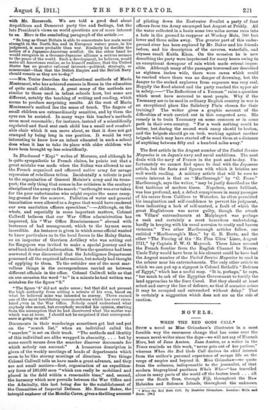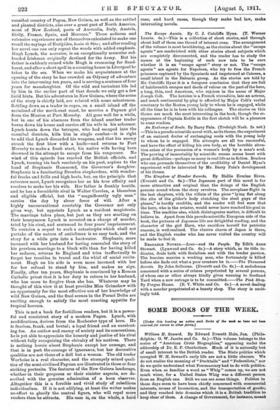NOVELS.
WHEN THE RED GODS CALL.*
SUCH a novel as Miss Grimshaw's illustrates in a most forcible way the enormous change that has come over the woman novel-writer since the days—we will not say of Hannah More, but of Jane Austen. Jane Austen, as a writer in the Times reminds us this week, "never gets out of her parlour," whereas When the Red Gods Call derives its chief interest from the author's personal experience of savage life on the verge of empire and beyond it. Miss Grimshaw--we quote from the columns, indispensable to the journalist, of that modern biographical pantheon Who's Who—" has travelled alone in many parts of the world off the beaten track . . . alt over the South Seas, through Fiji, throughout the New Hebrides and Solomon Islands, throughout the unknown • When the Eed Gods Call. By Beatrice Grimabaw. London: Mills and Boon. t68•1 cannibal country of Papua, New Guinea, as well as the settled and planted districts, also over a great part of North America, most of New Zealand, parts of Australia, Italy, Austria, Sicily, France, Spain, and Morocco." These arduous and extensive experiences are of themselves calculated to make one recall the sayings of Euripides, assehs rb eijXv ; and after reading her novel one can only repeat the words with added emphasis. Hugh Lynch, the narrator, is an exceptionally muscular red- headed Irishman originally destined for the Army. But his father is suddenly ruined while Hugh is cramming for Sand- hurst, and after a short spell in a counting house in Liverpool he takes to the sea. When we make his acquaintance at the opening of the story he has crowded an Odyssey of adventure into the intervening ten years, and is serving a sentence of four years for manslaughter. Of the wild and turbulent life led by him in the earlier part of that decade we only get a few lurid hints. But his adventures in New Guinea, where the scene of the story is chiefly laid, are related with some minuteness. Settling down as a trader in copra, on a small island off the mainland of the north-east coast, he marries a Papuan girl from the Mission at Port Moresby. All goes well for a while, but in one of his absences from the island another trader burns down his house and carries off his wife in his schooner. Lynch hunts down the betrayer, who had escaped into the cannibal districts, kills him in single combat—it is right to add that Lynch discarded his weapons, and that his enemy struck the first blow with a knife—and returns to Port Moresby to make a fresh start, his native wife having been drowned in the attempt to escape from his vengeance. No wind of this episode has reached the British officials, and Lynch, turning his back resolutely on his past, aspires to the band of Stephanie Hammond, the Governor's daughter. Stephanie is a fascinating Dresden shepherdess, with wonder- ful frocks and frills and high heels, but, on the principle that extremes meet, Lynch recognizes her as his true affinity and resolves to make her his wife. Her father is frankly hostile. and he has a formidable rival in Walter Carolan, a blameless and eligible official, but the " magnificently ugly man" carries the day by sheer force of will. After a highly unconventional courtship the Governor not only gives way, but appoints Lynch as a resident magistrate. The marriage takes place, but just as they are starting on their honeymoon Lynch is arrested on a charge of murder, tried by his rival, and sentenced to four years' imprisonment. To contrive a sequel to such a catastrophe which shall not partake of the nature of anticlimax is no easy task, and the story for a while gets into a backwater. Stephanie, more incensed with her husband for having concealed the story of his previous marriage to a black wife than for having killed her seducer, returns to England and tries ineffectually to forget her troubles in travel and the whirl of social excite. ment. Hugh on his side is even more incensed with her for her refusal to stand by him, and makes no sign. Finally, after ten years, Stephanie is convinced by a Roman Catholic priest that it is her duty to return to her husband, who has more to forgive than she has. Whatever may be thought of this view it at least provides Miss Grimshaw with an opportunity for the most effective use of her knowledge of wild New Guinea, and the final scenes in the Purari Delta are exciting enough to satisfy the most exacting appetite for tropical horrors.
This is not a book for fastidious readers, but it is a power- ful and consistent story of a modern Pagan. Lynch, with modifications, derives from the Rochester type of hero. He is fearless, frank, and brutal; a loyal friend and an unrelent- ing foe. An outlaw and enemy of society and its conventions, he is yet able to appreciate the honesty and justice of his rival without fully recognizing the chivalry of his motives. There is nothing heroic about Stephanie except her courage, and that is in part the courage of ignorance, but her decorative qualities are not those of a doll but a woman. The old trader Worboise is a real character, and the strangely mixed quali- ties of the semi-civilized Papuan are illustrated in three or four striking portraits. The features of the New Guinea landscape, whether in their gorgeous or their sinister aspects, are de- scribed with the genuine admiration of a keen observer. Altogether this is a forcible and vivid study of rebellious individualism. If it is not edifying, at least the writer makes no effort to glorify the central figure, who will repel more readers than-he attracts. His case is, on the whole, a bard case, and bard cases, though they make bad law, make interesting novels.







































 Previous page
Previous page